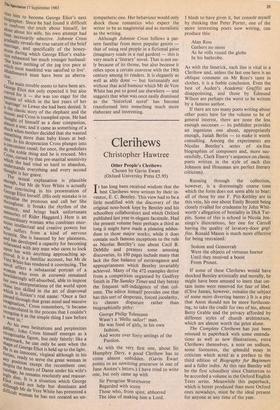Clerihews
Christopher Hawtree
Other People's Clerihews Chosen by Gavin Ewart (Oxford University Press £5.95)
T t has long been received wisdom that the
best Clerihews were written by their in- ventor, E. C. Bentley. This view had to be a little modified with the discovery of the original note-book kept by Bentley and his schoolboy collaborators and which Oxford published last year in elegant facsimile. Had the present volume been perhaps a third as long it might have made a pleasing adden- dum to those major works; while it does contain such famous exceptions to the rule as Nicolas Bentley's one about Cecil B. DeMille and presents some amusing discoveries, its iSO pages include many that lack the fine balance of extravagance and appropriateness which Bentley invariably achieved. Many of the 472 examples derive from a competition organised by Godfrey Smith in The Sunday Times and they betray the frequent self-indulgence of that col- umn. The editor himself provides one that has this sort of desperate, forced jocularity, its clauses disparate rather than biographically pithy: George Philip Telemann Wasn't a 'Hello sailor!' man. He was fond of girls, in his own fashion, And wrote over forty settings of the Passion.
As with the very first one, about Sir Humphry Davy, a good Clerihew has to come almost unbidden. (Gavin Ewart points to an unwitting precursor in one of Jane Austen's letters.) I have tried to write one, but only came up with Sir Peregrine Worsthorne Regarded with scorn Those who, from spite, abhorred The idea of making him a Lord. I blush to have given it, but console myself by thinking that Peter Porter, one of the more interesting poets now writing, can produce this: Alan Ross Gathers no moss As he rolls round the globe In his bathrobe.
As with the limerick, each line is vital in a Clerihew and, unless the last one here is an oblique comment on Mr Ross's taste in clothes, it is a feeble conclusion. Even the best of Auden's Academic Graffiti are disappointing, and those by Edmund Wilson are perhaps the worst to be written by a famous author.
If there are too many poets writing about other poets here for the volume to be of general interest, there are none the less enough successes — its publisher provides an ingenious one about, appropriately enough, Isaiah Berlin — to make it worth consulting. Among the experiments are Nicolas Bentley's series of six-line biographies of composers and, more suc- cessfully, Clark Emery's sequence on classic poets written in the style of each (his Johnson and Housman are perfect literary criticism).
Running through the collection, however, is a distressingly coarse tone which the form does not seem able to bear; all of those by one F. Pitt-Kethley are in this vein, his one about Emily Bronte being closely rivalled for crudeness by John Whit- worth's allegation of bestiality in Dick Tur- pin. Some of this is echoed in Nicola Jen- nings's illustrations, her one for Carroll having the quality of lavatory-door graf- fito. Ronald Mason is much more effective for being restrained:
Sodom and Gomorrah Were the objects of virtuous horror Until they received a boost From Proust.
If some of these Clerihews would have shocked Bentley artistically and morally, he might have been amused to learn that cer- tain items were removed for fear of libel. (Clive James, however, remains the subject of some more diverting banter.) It is a pity that Anon should not be more forthcom- ing, to take the credit for two of his, about Betty Grable and the privacy afforded by different styles of church architecture, which are almost worth the price alone.
The Complete Clerihews has just been reissued in paperback with some emenda- tions as well as new illustrations, extra Clerihews themselves, a note on sodium, some footnotes, the splendid essay in criticism which acted as a preface to the third edition of Biography for Beginners and a fuller index. At this rate Bentley will be the first schoolboy since Chatter-ton to be accorded a volume in the Oxford English Texts series. Meanwhile this paperback, which is better produced than most Oxford ones nowadays, must be the ideal present for anyone at any time of the year.






































 Previous page
Previous page